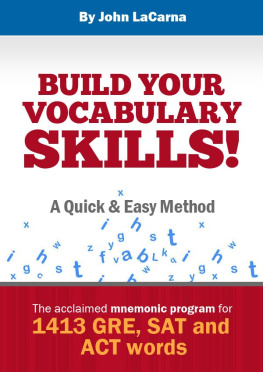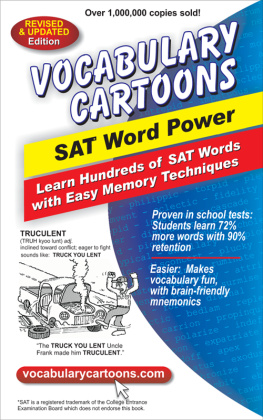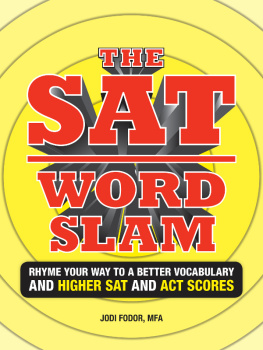Build Your Vocabulary Skills!
A Quick and Easy Method
by
John LaCarna
To Gussie
CONTENTS
PREFACE
This book will enable you to increase your English vocabulary as quickly and easily as possible. The immediate focus is on expanding your recognition vocabulary -- the words you are able to understand. You will learn and retain forever the meanings of words you are most likely to encounter in your reading, and on various psychological, academic, and professional tests. The method presented here is starkly goal-oriented -- you might say ruthlessly so. The aim is that after applying yourself to this book, you will be able to supply a synonymous definition for up to 1413 words you did not know before. We are not concerned with learning derivations or word roots. These matters may be interesting and important but they are irrelevant to the business at hand.
Our purpose right now is to get a higher score on that SAT or GRE next week, or to gain a deeper understanding of those novels and non-fiction books you read throughout this year and every year from now on. The words you will learn are derived from lists of study words for academic tests and are judged to have the widest general use.
Another phase of vocabulary development involves the active vocabulary -- words you use in your own speech and writing. We don't provide a quick method to improve that -- we don't know of any -- but we can point you to a couple of easy ways.
You will find that as you use this book and recognition vocabulary grows, words that you previously skimmed over in your reading will stand out. When you encounter them, you will automatically take note of the new words you have learned. In this way, over time, you will get a feel for proper usage, for the nuances of denotative and connotative meaning. Then these words will naturally pass into your active vocabulary as they did when you were a child originally acquiring language. This process might be accelerated by using one of the books available at book stores and in libraries, designed to enable their readers to use the words they present.
We strongly recommend against using words before you assimilate their precise meanings. If this is done in an attempt to impress others, it may well have the opposite effect, for there's no more pathetic sign of a poorly educated person than the inappropriate use of a five-buck word. Make sure that you really know words before you use them.
THE TECHNIQUE OF MNEMONIC VOCABULARY BUILDING
The word "mnemonic" refers to a device that assists in the acquisition and retention of matter to be memorized. In this book, we will use such a device to expand your vocabulary. We will teach you new words by artificially associating each one to its definition, using what we call a "key" and a "link sentence".
Research has established this method to be effective for learning both English and foreign language vocabulary words. To illustrate the method, let's take the word mnemonic itself. How would we associate it with its meaning? Well, mnemonic sounds somewhat like pneumonia , so suppose we use that as the key. So now mnemonic calls up pneumonia in our minds, but how does this remind us of memory systems ? What would a good link sentence be? Well, suppose we think of our grandfather having a bout of pneumonia so severe he loses his memory of who we are.
So, the next time we see the word mnemonic we will think of pneumonia . We ask ourselves, "What about pneumonia ?", and we answer, "Grandpa had pneumonia so bad he lost his memory . Oh that's it! Mnemonic has to do with memory systems ." In the format of Build Your Vocabulary Skills , we have:
MNEMONIC (neh MAHN ik) related to a memory system
KEY: PNEUMONIA
LINK SENTENCE: Grandpa had pneumonia so bad he lost his memory.
Now, answer the following without looking at the above:
MNEMONIC What is the KEY?
What is the LINK SENTENCE?
What does MNEMONIC mean?
So if you didn't know mnemonic before, drill yourself on this a couple of times. You've already learned a new word. Still not convinced? Already knew mnemonic ? Well, let's try another word, one we're fairly sure you don't know. How about defenestrate , which means to throw out of a window . If you know that one offhand, you probably don't need this book.
What does defenestrate remind you of? How about defend the street ? Well, we could Imagine that the enemy troops invaded a city, and the citizens defended their streets by throwing objects out of the windows at them. So, we have the following:
DEFENESTRATE (duh FEN es trate) to throw out of a window.
KEY: DEFEND THE STREET
LINK SENTENCE: The townsfolk defended their streets against the enemy invaders by throwing things out of the windows at them.
Now, without looking:
DEFENESTRATE What is the KEY?
What is the LINK SENTENCE?
What does DEFENESTRATE mean?
Now, drill yourself another time or two. You've learned another new word, and will retain it to the days of your dotage.
Admittedly, this word is of quite limited use, but we wanted to illustrate the principle by actually teaching you a new word. Over fourteen hundred much more useful words follow, so don't defenestrate this book yet.
The thought might have occurred to you, "Why do I need this book? I can just make up my own keys and links for words I want to learn."
Sure you can, and more power to you if you will . You can write this whole book yourself in your own way. But in reality, most people wont . Also, despite the common-sense expectation that associations you develop yourself would be superior because of their personal nature, and because of the mental effort made using the words to be learned, this is not attested to by research. When subjects were provided associations by the researchers, they learned and retained material at least as well as, if not better than, when they generated their own associations. So we can be confident that our list of ready-made associations provide an effective means of vocabulary development.
HOW TO USE THIS BOOK
This book may be used as a dictionary, or a text for a course of study. You can look up unfamiliar words as you run across them in your reading, just as you might do with an ordinary dictionary -- but with the difference that the meanings will be locked in your memory. But most of you will want to use this book as a text to increase your vocabulary systematically. You can start with the A's and go through the Z's, or you can skip around, checking off each word you complete. In either case, you will, of course, skip the words you already know.
As much as we tried to minimize effort on your part in using this method, a degree of application is unavoidable. For each word, first note its pronunciation and meaning. Pronounce it several times mentally or aloud. Then note the key word or words. Pronounce the original word followed by the key a few times. Then read the sentence linking the key to the meaning. It's not important that you memorize it word for word, just that the connection between the key and the definition is noted. If you think mainly in words, verbalize the link sentence. If you think in visual images, create as vivid a mental picture as you can of the relationship expressed by the link sentence.
Now look away from the page and think step-by-step of the word, the key, the link sentence, and the definition.
For general vocabulary improvement, we recommend that you study groups of five words each. After you've gone through five, use the list of words in this book to drill yourself by reciting keys, link sentences, and definitions. Then fill in any gaps in your learning by review and recitation, and move on to another five.
Next page






